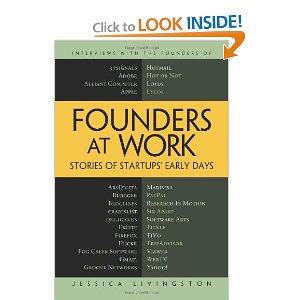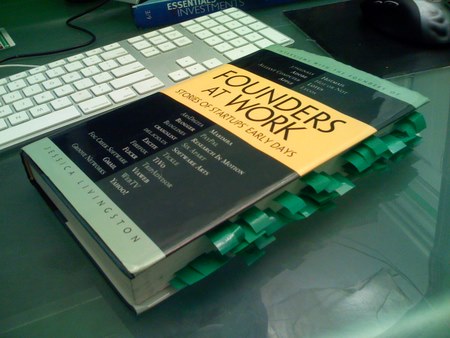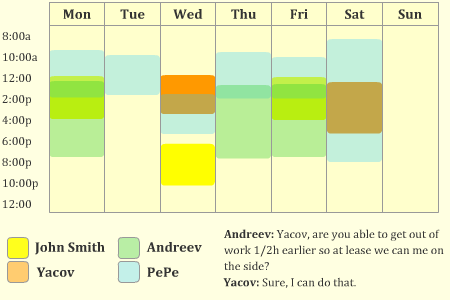When I started this blog I set off to create a full story of my entrepreneurial struggle. I have been working on it mostly implicitly by writing out my thoughts and keeping up book reviews with what I read. I feel though that an explicit update is needed every now and then, so here is one that explains my current whereabouts.
After having been through a billion ideas and finished none, I decided to jump into ONE thing ONLY and pull it off till the end. My choice was Snartle.com, the language learning site since I trust my guts and feel like my theory of how a mind is able to suck new information will be right. In addition, the market is growing like crazy. Livemocha (got 2mln funding I believe) and SpanishPod both made the Times the other day, and I think neither is really good or with much innovation in methodoly of learning. They just are there and in such market whoever is there makes it (apparently really well too).
But I mentioned how I have been struggling between looking for funding and making it myself. We finally settled for funding, and no surprise – it feels like we chose wrong. On the other side, I am pretty sure it would have felt the same way if we went with building it. So funding is planned through winning the the Merrill Lynch competition and if we don’t win it (which I feel we have decent chances) I will be totally lost. If I then decide to build it, I would have gone BOTH paths to reach the target. Why didn’t I just tried making it off the beginning? My guilty consciousness will chase me for a long time. Though if we do win the 60,000 from Zicklin, then…..then there’s going to be more posts.But for now, got no product – just a business plan ‘in construction’.
So far so OK. I feel like I am on the right track and I push. Before I know it though, I am filling a new YC application – this time it was supposed to be just a joke. As a project, we decided to use our first launch (for five years!) – a blog. A blog we launched for all this time! It was a music blog and it felt good to put some of our favorite music online and listen to it and share with friends. Turns out Alek was serious about the YC app, which he filled quite diligently, and that he has serious plans about it. I realize now our music blog was the beginning of a new startup, which we will be launching in … 2 weeks?!@# How da hell did I get involved in another startup again?! Our blog, you can find at thefeelgood.com. It has got some good music today, and stay tuned for the startup launch.
Meanwhile more ideas keep coming to me (yes, they will all end up here). One of them seems to be stuck with me for some time. I haven’t shared it online because I believe I may decide to do in the near future when I have resources.
Actually resources is what I really wanted to talk about. I have no job. Ever since I decided to work on ONE thing I have been trying not do anything but work on the startup, which meant absolutely no wasting time on crappy external jobs. Now though I am running out of money and this drives me nuts. My budget has thinned out to mere $100/mo that I can live on besides my fixed costs of another $200 (subway, cell, credit card). I am basically surviving on $400/mo in New York and this is crazy. What is crazier is that soon the last few hundred bucks that I have will run out. I have to take a job but what I can do is apply at my school for a job under $10/h which is just a waste of life, or I can work some side projects as a freelancer. I used to make Flash sites like this one, but now I think that connection soured up. It’s nuts to think how people that work the crappiest jobs have more money than me. It’s a psychological breakdown. I may have to crack open and take a job or I will starve. ‘Die’ is probably the right word here, since I am already starving.
I already talked about the Up’s and Down’s of the roller coaster and here is another wonderful example of a down. It is quite a down this time – deeeeep and loooong. I am miserable and I am barely surviving. And it seems like it will keep going worse. If it wasn’t for the possible upsides that I see in a few months from now, I would have given up. But that insane feeling that “I am almost done” with something and soon “it will pay off” is just not going away, and drags me down, and down, and down.
Let me mention some more just for a little color. My wisdom tooth is growing – as to be taken out some time soon and yes, you guessed it – I can’t pay for it. My stomach pains me. Hmm..yes, I should be eating better food. But what better food when I am eating anything I can find? I just cut my hair on my own, since I have to otherwise pay 15 bucks, with which I can eat at least 3 times. I have never had such attitude towards money saving but times change and when you don’t have money, elasticity can get practically to zero;
Damn that UP should be right around the corner because I am in B I G trouble…








